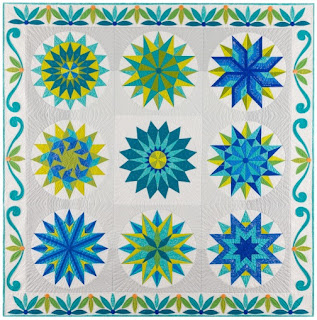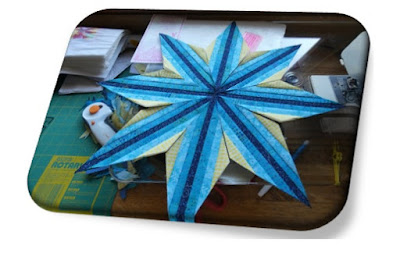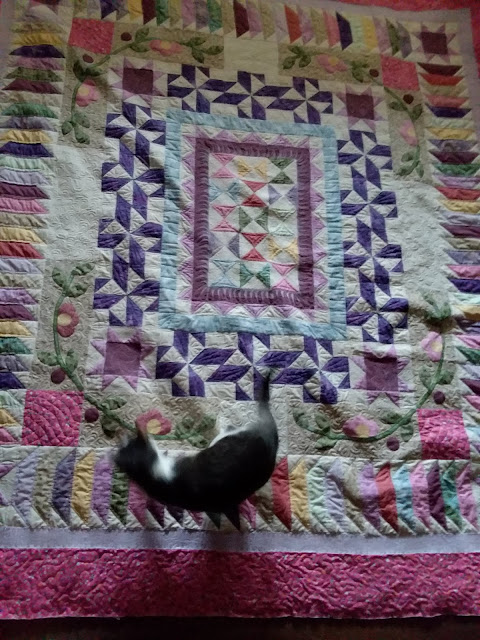I just finished sewing nine random quilt blocks into one cohesive piece. It is almost a quilt though it is still not yet finished. It will have a five-inch border around all four sides, with applique motifs. And of course, it will have to have a backing fabric and batting inside before I can quilt it. Perhaps it will be done by this time next year.
This project has been a joy to work on; offering just the right challenge to my skill level. I believe this project has enhanced my skills because I nailed it. Though it may not be my design, I have certainly made it my own by choosing some of my favorite colors using fabrics I have been collecting for years. I love the round blocks, the points, the shapes and overall symmetry of its elements.
This quilt, designed by Becky Goldsmith as the 2019 Block of the Month for
The Quilt Show co-hosted by one of my favorite quilting instructors, Alex Anderson (and Ricky Timms who I have only recently become acquainted with), is called Sizzle.
The best part about this quilt is that it reminds me of my father. I was drawn to it the moment I saw it.
While sewing the seams together, I thought about that. My father died at age 79, in 2003. This is the time of year I’d always thought about him. His birthday would have been in two days.
My father was the smartest man I’d ever known. He was also the most tolerant, patient, and easy-going person with a delightful sense of humor. He loved a challenge; the harder the better. And he was a bit of a mathematical genius. There wasn’t anything my father couldn’t do, and I’m not the only one that says that. Everyone who knew him sang his praises. He taught himself everything he knew, and in my view, he knew just about everything. I remember one year at Christmas time, when I was just a little girl, maybe five or six-years old, he made a three-dimensional star for the top of our Christmas tree out of cardboard, meticulously gluing each piece together. I can’t recall how many points it had, but it was certainly more than the typical five, six, or even eight-point star. He meticulously glued red and green Christmas wrapping paper onto the points. It was beautiful, and it was perfect.
Another year, he decided to learn woodworking. As was his habit, he sat down with a few books and taught himself. He also did that with photography, computer programming, playing the organ, and so much more.
He was a machinist by trade, so mathematics and using tools was his thing.
For Christmas one year, he made family members an icosahedron, a 20-sided object constructed out of varied wood veneers by using equilateral triangles. I cannot imagine how to even begin to figure the dimensions mathematically, but that came easily to him. He figured it out, cut the pieces, and then glued them together. I’m heartsick that I no longer have the one he gave me, but it was damaged beyond repair some years ago.
So stars and points, intricate design, and challenges will always remind me of him. The moment I saw this quilt pattern, I was completely taken by it. I had to make it, even though I questioned whether or not I could. And I’m glad I did.
I think my father would have loved everything about this quilt as I do, so I am making it for him, to honor him. Happy Birthday Dad.













